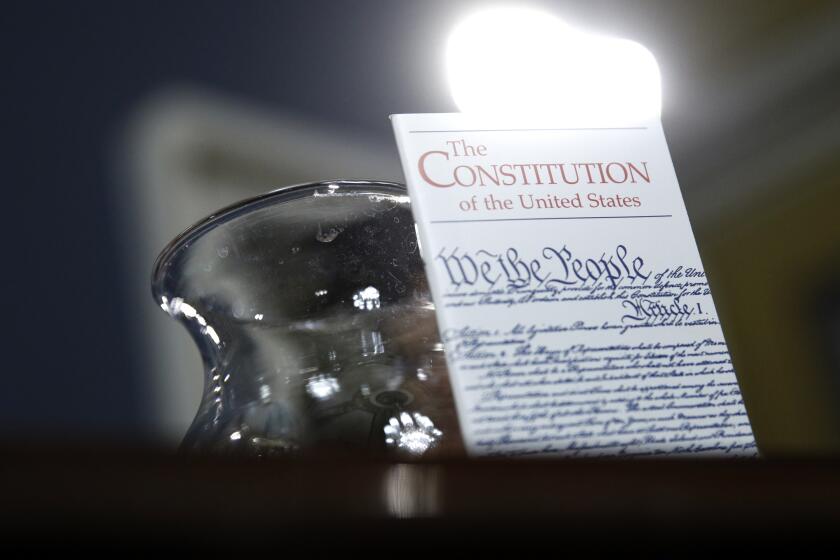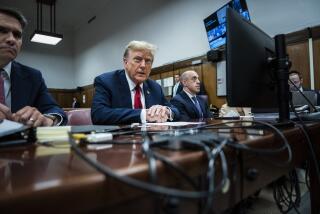Senate trial of President Trump begins with a clash over rules, witnesses
- Share via
WASHINGTON — The Senate impeachment trial of President Trump began in earnest Tuesday with a tussle between Republicans and Democrats over whether witnesses should be called immediately, a question that is all but certain to remain unresolved until after the first phase of the trial, when the two sides present their arguments.
Democrats this afternoon plan to force several votes on subpoenaing witnesses — votes that Republicans have pledged to band together to defeat.
“Republicans have the votes to start the trial” without witnesses, as occurred in the 1999 Senate impeachment trial of President Clinton, said Sen. Kevin Cramer (R-N.D.). “Beyond that will be informed by what happens.”
President Trump’s defense arguments began on Saturday and continue this week. Senators will then get 16 hours to submit written questions followed by an opportunity to debate whether witnesses should be called. That debate could occur as soon as Thursday.
A handful of Senate Republicans say they are open to considering witnesses after the first phase of the trial — after both Trump’s legal team and House Democrats, acting as prosecutors, get time to present their cases to senators and respond to senators’ written questions. But even they — including Sen. Mitt Romney (R-Utah) — have no problem with the initial rules Senate Majority Leader Mitch McConnell (R-Ky.) will offer Tuesday afternoon despite some differences between this year’s rules and those offered during the Clinton trial, such as 24 hours of arguments stuffed into two days instead of three.
The 47 Senate Democrats would have to convince four Republicans to support their effort to subpoena witnesses or the effort would fail, meaning the trial could wrap up in far less time than Clinton’s five-week trial, which ended with his acquittal.
Although it appears a near certainty that Democrats won’t have the 67 votes needed to convict Trump and remove him from office, the possibility of four Republicans bucking their party to issue subpoenas has added a huge sense of uncertainty to the trial.
Trump is charged with two articles of impeachment. The first, for abusing his power, concerns his efforts last year to pressure the government of Ukraine to dig up dirt on a political opponent, Joe Biden, by withholding congressionally approved military aid and a White House meeting. The second, for obstruction of Congress, focuses on his directions to aides not to testify or provide documents to the House impeachment inquiry.
The first order of business Tuesday will be a vote on McConnell’s proposed outline for the trial. That vote is expected to take place by the end of the day.
Under the proposed rules, beginning Wednesday, the House would have 24 hours over two days to make its case, followed by 24 hours over two days for the president’s team. Senators then would have 16 hours to ask questions of both parties.
From there, the Senate would move to the pivotal question of whether witnesses and documents should be subpoenaed.
McConnell has framed the rules as very similar to the rules for Clinton’s trial. Though the number of total hours is the same, neither party in the Clinton trial had to cram them into two days.
Democrats are frustrated by other changes in the rules: If the witness vote fails, it would be all but impossible for senators to offer more motions for witnesses. Plus, the Senate won’t automatically include the House’s impeachment inquiry record as evidence.
Senate subpoenas would open the possibility of forcing testimony from several current and former administration officials who refused to participate in the House impeachment effort, and who potentially could provide new or incriminating information about the president’s actions.
The Senate “gets to decide whatever it wants with 51 votes,” said Sen. Brian Schatz (D-Hawaii). “It really does depend on whether we can find four Republicans who will demonstrate their independence — not rhetorically, but with a vote.”
The debate over witnesses will put to the test the vice-like grip McConnell has maintained over his group of Senate Republicans for upward of a decade.
If McConnell can keep all 53 Senate Republicans together to oppose the witness effort, it would mark a victory akin to the wall the GOP erected in an unsuccessful effort to block passage of the 2010 Affordable Care Act, or its successful push to keep a Supreme Court seat open for much of 2016.
Three Republicans already have signaled openness to witnesses — Romney, Lisa Murkowski of Alaska and Susan Collins of Maine.
Murkowski’s and Collins’ history of bucking their party on occasion — both opposed an Obamacare repeal in 2017, and Murkowski opposed the appointment of Brett M. Kavanaugh to the Supreme Court in 2018 — has made some Republicans close to the president privately worried that history could repeat itself at a pivotal moment.
There are other possibilities for surprises during the trial.
If the effort to subpoena witnesses is successful, it would force a likely standoff between the Republican-controlled Senate and a Republican White House over claims of executive privilege versus congressional oversight. Trump already suggested he would claim executive privilege if a subpoena were to go to former national security advisor John Bolton — a top target of Democrats who has said he would comply with a Senate subpoena.
In addition, new information has come out since the House voted to impeach on Dec. 18.
Lev Parnas, a former associate of Trump lawyer Rudolph W. Giuliani, has turned over documents and given media interviews in which he said he and Giuliani tried to convince Ukrainian President Volodymyr Zelensky’s administration to conduct an investigation into Biden and his son as part of an effort to ensure Trump would win reelection.
And lead House trial manager Rep. Adam B. Schiff (D-Burbank) said he expected more evidence to come out in the course of a trial.
It is unclear how aggressively Chief Justice John G. Roberts Jr., who is presiding at the trial, will insert himself in the Senate’s actions. The rare nature of a Senate impeachment trial means some scenarios are relatively unknown, such as the role Roberts can and cannot play in how the Senate might handle a potential 50-50 tie.
The impeachment trial also requires changes to some normal Senate procedures. Senators are largely not allowed to speak during a trial, so disputes — such as one expected Tuesday on witnesses — will likely mean that the Senate will go out of session so senators can speak privately, and the C-SPAN camera will be shut off and reporters ushered out of the chamber gallery.
Trump adds his own uncertainty. Although he is the defendant, he likely will tweet commentary and talk to reporters as the trial proceeds, offering real-time analysis of his lawyers’ performance, advice to Senate Republicans, and caustic comments about his critics.
The Senate itself will be a bit transformed. Typically, only senators can speak on the Senate floor and senators rarely sit at their desks, instead coming and going when votes are called.
But for the trial, senators have been instructed to remain quietly at their desks for the length of the proceedings, electronics are supposed to be kept in newly installed cubbies outside the chamber, and even outside reading material unrelated to the trial has been banned.
The only people allowed to speak will be Roberts, McConnell, the House managers and Trump’s lawyers.
The slow pace might be particularly irksome to the four senators — Bernie Sanders (I-Vt.), Elizabeth Warren (D-Mass.), Amy Klobuchar (D-Minn.) and Michael Bennet (D-Colo.) — who are running for president and will spend weeks in the Senate instead of working the campaign trail.
But the pace will pick up dramatically after House managers and Trump lawyers complete their presentations, likely on Saturday if McConnell’s rules are approved by the Senate as expected. At that time, senators will have 16 hours to ask questions — written down and submitted to Roberts — of lawyers on both sides. After that, the senators will get back to the question of witnesses.
Democrats are confident that, even if they lose the opening votes on Tuesday, they will have a better shot at gathering GOP support at the end of the first phase, which is likely to end early next week.
The outlook of the witness vote may depend in part on how the first phase is viewed by the public. If Republicans feel like the trial appears incomplete, they may feel pressure to call witnesses.
Collins said Thursday that she was “likely” to support calling witnesses at that time. She is working with a “fairly small group” of Republican senators on a plan to call witnesses, she told reporters in Maine this month. Romney has said he’d like to hear from Bolton. But both Romney and Murkowski have refused to weigh in on the process of calling witnesses until later in the trial.
Others who are viewed as potential GOP supporters have been more coy.
“I will wait to see whether if after hearing the case and everyone ask their questions, which will be an extensive process, whether I think we need more information, and if we do, I might — I’ll vote to get more information. If we don’t, I won’t,” said Sen. Lamar Alexander (R-Tenn.).
But the issue is not clear-cut. Many Senate Republicans have insisted that they will not support any arrangement in which one side of the case gets to present witnesses and the other side doesn’t.
“It may be a tough debate,” admitted Sen. Mike Braun (R-Ind.). “If we get there, I know [reciprocity] would be an important thing to me. And then I think that also makes the discussion difficult” for Democrats, he predicted.
That means if Democrats get to call Bolton, Parnas or Mick Mulvaney, acting White House chief of staff, then Trump’s lawyers will get to call witnesses too. At the top of Republicans’ wish list would be Biden’s son Hunter. Some want to call Schiff, who is acting as the House’s lead impeachment manager.
“What’s fair for the goose is fair for the gander,” said Sen. Mike Rounds (R-S.D.). “If we think [the House has] given probable cause to actually bring in witnesses, most certainly the president has every right to call his witnesses as well.”
More to Read
Get the L.A. Times Politics newsletter
Deeply reported insights into legislation, politics and policy from Sacramento, Washington and beyond. In your inbox three times per week.
You may occasionally receive promotional content from the Los Angeles Times.












